- Home
- Suzanne Selfors
Smells Like Treasure Page 8
Smells Like Treasure Read online
Page 8
Dog lunged at the cookies. Crumbs sprayed here and there.
“How come you don’t like dogs?”
“They bite.”
Homer didn’t know what to think about this Hercules person. But he didn’t want anyone to freak out just because of Dog, so he pulled Dog away from the leather chair and the last two cookies. For a moment, only the crackling of the fire filled the room, but then Dog barked as the front door slammed shut. Zelda hurried into the living room, her black cape and silver hair glittering with sea spray.
“You didn’t bolt the door,” she said. Then she blew out her lantern and set it aside. “No matter. I didn’t see signs of anyone.”
“But I heard footsteps,” Homer said. Momentarily distracted, he let go of Dog’s collar. Dog trotted back to the cookies and inhaled them. “Dog heard them, too.”
“I am not questioning you, Homer. I believe that someone was following you.” She tossed her cape aside. “But whoever was out there is now gone. No one would choose to spend a night on the moor. The night air is thick with sadness. And frogs.” She removed her sturdy black boots and placed them in front of the fire. “I see you two have met. Hercules arrived this evening, earlier than I’d expected. That’s why I didn’t get to the train station in time to meet you, Homer.”
Hercules leaned over the armrest and nervously eyed Dog, who was licking crumbs off the carpet.
“Homer, take off those muddy shoes and that wet raincoat,” Zelda said. “We don’t need you getting sick.”
While Zelda collected some towels, Homer set his muddy shoes, wet socks, and raincoat by the fire. As he dried his hair with an extra-large towel, Zelda knelt and dried Dog, rubbing him from head to tail. His back legs did a little dance as she rubbed. “We don’t want you to get sick, either,” she told Dog. He pressed his nose to hers, their gloomy expressions almost identical.
“Make yourselves comfortable,” Zelda said. As Homer settled on the patched couch, Zelda stirred a cauldron that hung over the fire. “I like to cook this way,” she explained. “Power is precious out here. There’s not enough sun for solar panels. My windmill is just enough for the necessities.”
She dipped a ladle into the pot and filled four bowls with stew. Famished, Homer ate almost as quickly as Dog. The little round potatoes and baby carrots melted in his mouth.
“Are there any peanut products in the stew?” Hercules asked, staring into his bowl.
“Are you allergic to peanuts?” Zelda asked.
“No. But I could be.” Hercules frowned. “I’d rather not take the risk.”
“There are no peanuts,” Zelda said, reaching out to pat Hercules’s knee. “Do not fret. Too much fretting can make a person sick.”
“It can?” Hercules twitched.
Zelda went into the kitchen and brought back three cups of cocoa. Warmed by the fire and the stew, Homer relaxed, sinking into the corner of the overstuffed couch. Dog stretched in front of the fire, his white belly absorbing the heat like a crumpet in a toaster.
Hercules, however, sat very rigid and poked his spoon through his bowl. “These carrots really should be cut into smaller pieces. At this size they pose a choking hazard.”
“Hercules,” Zelda said as she sat on the other end of the couch. “Would you like to tell Homer why you are here?”
“Sure.” Hercules glanced at Dog, who was fast asleep. Then he stood up, reached into his pants pocket, and produced a small scroll. “I was entrusted with a top-secret message. Shall I read it again?” Zelda nodded. And so he read it aloud.
Dear members of the Society of Legends, Objects, Secrets, and Treasures,
I’ve been told that for some cockamamie reason, we need to have another confounded meeting to discuss some kind of gobbledygook or other.
I’ve been told that you all need to be there, so stop your lollygagging. It’s going to be a big kerfuffle. That’s all I know.
Signed,
Your current president, LM the XVIII
Postscript. It’s Gertrude’s turn to bring muffins.
Post-postscript. The meeting’s at Zelda’s shack, June 21st, 7 p.m.
Homer burst into a smile and plunked his mug of cocoa onto the marble coffee table. “Tomorrow night? Here?”
“Yes,” Zelda said.
Tomorrow was, well, TOMORROW! So overcome with excitement, Homer practically yelled out the word. It was happening. It was really happening. He beamed at Zelda, then his gaze fell on the letter. Why had Hercules been entrusted to carry such an important message? “Are you a member of L.O.S.T.?” he asked.
“Yes,” Hercules said. “But I’m not a treasure hunter. I’m an employee.”
“L.O.S.T. has employees?” Homer asked.
“Two employees,” Hercules said. “I am the official records keeper. I arrange all the meetings, transcribe the meeting logs, process and preserve documents, acquire necessary questing permits, allocate funds, et cetera.” He placed his hand on his forehead. “I might be getting a headache. Have you had this room tested for black mold?”
“Hercules is fourteen years old—our youngest member,” Zelda said, ignoring Hercules’s health concern. “At least, he’s our youngest member until you are granted membership, Homer.”
“How did you get membership?” Homer asked.
“I won this year’s World’s Spelling Bee,” Hercules replied, pulling off the lid to his first-aid kit.
“Our former records keeper was crushed by a rogue filing cabinet. We needed someone with excellent language skills,” Zelda explained.
“The World’s Spelling Bee?” Homer asked with astonishment. Every year, Mrs. Peepgrass held a spelling bee in the Milkydale schoolhouse. This year Gwendolyn lucked out and got milk as her first word. Homer got illustrious and didn’t make it to the second round. “You’re the champion of the entire world?”
“Yes.” Hercules pulled out a thermometer and stuck it into his mouth.
Homer nodded, impressed by such an accomplishment. Someday he’d be the greatest treasure hunter in the entire world. “Who’s the other employee?” he asked.
“She’s called The Unpolluter,” Zelda said, getting up to put another log on the fire. A sizable log, but her large hands easily scooped it up. Dog groaned and shifted position, aiming his backside for a round of toasting.
“What does The Unpolluter do?” Homer asked Zelda.
“The Unpolluter’s job is very important. Let’s say that one of our adventurers does something he’s not supposed to do. And let’s say it makes someone angry and it gets into the newspaper. The Unpolluter steps in and cleans up the problem. It’s her job to make sure that our society remains a secret.”
“She cleaned up after your Uncle Drake on many occasions,” Hercules said, reading his thermometer. “I never met your uncle, but I know all about him because I’ve read all the paperwork.”
Homer looked at Zelda for an explanation. “Drake didn’t like rules,” she told him as she returned to the couch. “And he had no patience, so he sometimes made a mess.” She took a sip of her cocoa, then sighed. “Every time I mention his name the grief rushes back. I miss him so.”
While Hercules arranged items in his first-aid kit, Homer finished his cocoa. As much as he missed his uncle, he didn’t want to talk about sad things. Tomorrow was going to be the most exciting day of his life. “What will happen at the meeting?”
“I will present you to the membership,” Zelda said. “And they will each be given the opportunity to ask you questions. Drake made it clear that he wanted you to take his place, so the transfer of membership should go smoothly.”
“What about the one person?” Homer asked. “The one you think doesn’t want me to join.”
Zelda collected the empty cocoa mugs. “Let’s not worry about that. Drake wrote a letter to the membership about you. The letter is on file. No one can dispute that.”
“I filed the letter myself,” Hercules said. “In triplicate.”
While Zelda carried the
mugs into the kitchen, Homer collected the stew bowls and spoons and followed. “I should call my parents,” he said. The call was short because everyone in the Pudding household was getting ready for bed. It would be a big day tomorrow at the fair since the Pudding dogs had made it to the second round of competition. After assuring his mother that he’d take a bath, brush his teeth, and put on clean underwear, Homer hung up the phone. Zelda handed him a folded piece of paper.
“Ajitabh sent this for you,” she said. “Go on, read it.”
Homer sat at the kitchen table and read Ajitabh’s letter. The inventor’s singsong accent rang clear in Homer’s head.
Hello, Homer,
So disappointed that I can’t be there for your big day and all that. Had to dash off to New Delhi to visit dear old Dad, who’s having some problems with his ticker.
I’ve sent word to the membership that I wholeheartedly support your inheriting Drake’s chair. It’s sure to be an exciting meeting, by Jove, and I’m bloomin’ sorry to miss it. But I know that you’ll make your uncle proud.
Give my best to that hound of yours. Cheerio.
Your chum, Ajitabh
Ajitabh had been one of Drake’s closest and most-trusted friends. To have his support, even if from a long distance, helped steady some of Homer’s nerves.
“I think a good night’s sleep is in order,” Zelda said when Homer returned to the living room. “I’m afraid I don’t have guest rooms. I seldom have guests in my lonely part of the world. You’ll have to sleep on the couch. Or on the carpet by the fire.”
“That’s fine,” Homer said. He was willing to sleep on the roof if need be. Just so long as he was here, tomorrow, for the meeting. He carried his backpack into the bathroom, where he changed into his pajamas.
Zelda collected blankets and pillows and set them on the couch.
“I hope it’s not a feather pillow,” Hercules said. “What if a feather gets loose in the middle of the night and I inhale it and die?”
“The pillows are made of foam,” Zelda assured him. Then she blew out the lamps so that the only light came from the fireplace. “Good night,” she said. “Be sure to keep the front door bolted.”
“But you said the person who was following me is gone,” Homer said.
“That is not why I want you to keep the door bolted,” Zelda said, pushing a silver lock from her weary eyes. “You must keep it bolted so that the wind does not blow it open. If the wind blows it open, then the sadness of the moor will rush in and invade our dreams.”
Homer was starting to get used to Zelda always being sad in much the same way that you get used to ice cream always being cold.
Slow, heavy footsteps sounded as Zelda made her way upstairs. The ceiling creaked as she walked to her bedroom. Hercules, already in his pajamas, arranged a pillow and blanket on the couch. Homer opened his backpack and pulled out his book. Hercules rifled through his first-aid kit, pulling out vitamin jars, cough drops, and tubes of various ointments. He sprayed something into his mouth, rubbed something onto his throat, and chewed a couple of orange vitamins.
“Do you get sick a lot?” Homer asked.
“I never get sick. But I worry that I might get sick.” He climbed under the blanket and pulled it up to his nose. “Is your dog going to sleep in this room?”
“Uh, yeah,” Homer said.
“Will you make sure he doesn’t jump on me?”
“Okay.”
“Do you know how to perform cardiopulmonary resuscitation? In case I stop breathing in the middle of the night?”
“No,” Homer said.
“I am sorry to hear that. Well, good night.” And with that, Hercules rolled onto his side, his back to Homer.
“Good night,” Homer said. He felt kind of sorry for Hercules. What kind of a person worries about choking on a feather from a feather pillow? If anyone in that room had reason to worry, it was Homer. Would he make a fool of himself at tomorrow’s meeting? Would he know the answers to the questions? Would he make his uncle proud?
And would he ever find out who had followed him on the moor?
Homer arranged the pillow and blanket on the floor and lay down. Dog stretched next to him, his head on the pillow. Homer knew there’d be a big drool stain in the morning, but he’d gotten used to that. He also knew that Dog would kick while dreaming, but Homer had gotten used to that, too. Funny, but just a few months ago, Homer had never slept next to a dog, but now he couldn’t imagine not having the warmth to curl up against.
He pulled another blanket over himself. Then he opened The Biography of Rumpold Smeller and read by firelight.
14
Rumpold Smeller the Boy, Part II
Homer didn’t know this, but the book he was reading was complete rubbish. A lot of biographies are complete rubbish. Sometimes the author, in an attempt to make the subject of the biography appear to be more heroic, will mess with the facts—or will ignore the facts altogether. That is why when reading history, one must always consider who wrote the history. In the case of Homer’s book, The Biography of Rumpold Smeller, the author was a man named Bernard Dullard, a whackadoodle who really wanted to write a bestseller. His other books, How to Grow Pineapples and Where Lint Comes From, were total flops. His biography on Rumpold, however, became a bestseller among treasure hunters and pirate aficionados, which are people who are devoted to pirates. But there is very little truth in the book. It is a story. A myth.
Here is the truth.
When Rumpold Smeller turned twelve, his father, the Duke of Estonia, called him to the armory for an important discussion. Rumpold knew it would be an important discussion because a servant had laid out his very best clothes, which consisted of some itchy trousers, a high-collared ruffled shirt that tickled his chin, and a waistcoat with shiny buttons. He also knew it would be an important discussion because his mother had been told not to interrupt them. So she waited outside the armory, her ear pressed to the wall. Eavesdropping beside her was Rumpold’s twin sister, Rumpoldena.
Duke Smeller of Estonia stood before a shiny array of armor. “Hello, my son,” he said as Rumpold entered.
“Hello, Father,” Rumpold said, trying his best not to scratch his bottom. He couldn’t wait to get out of those clothes. The day was cool but clear—a perfect day for wandering around with his sketchbook. The best things to draw were discovered when wandering—an overturned black beetle, a dew-covered rose, a napping hawk.
Duke Smeller ran his hand over a plated helmet. “This armor belonged to my father,” he said. “And this set over here belonged to my father’s father.” Then he stared at Rumpold’s ear. Rumpold reached up and removed a piece of drawing charcoal that he had tucked behind his ear. Duke Smeller frowned. “You are nearing manhood,” he said. “Soon you will need to put away those childish drawings of yours. Your body will change and you will look like me.”
Rumpold fidgeted. He didn’t much care about growing a beard. Becoming a man meant other things he didn’t much care about, such as fighting in wars and getting married.
“You will take my place as duke,” his father said.
“Are you sick?” Rumpold asked. Was this why his father had called him to the armory?
“No.” The duke laughed. “I do not mean that you will take my place today. Today I am in full robust health.”
“And let us pray that you stay that way for a very long time,” a voice said.
Rumpold turned around. A man had entered the armory. A head taller than the duke, and a shoulder’s width wider, he stared at Rumpold with black eyes.
“Rumpold, this is Duke Vladmir.”
“Hello,” Rumpold said, bowing low as he’d been taught.
“Rumpold,” Duke Vladmir said, “do you know why I am here?”
“No,” Rumpold answered, wishing he could get away. Sunlight poured in through the windows, bouncing off the wall of swords. Rumpold squinted. He wished he could run across the manicured lawn and climb that ancient oak tree. There, in its hig
hest branch, he could see all the way across the valley. He’d sketched the landscape many times, but each sketch revealed an entirely different world.
Duke Vladmir sat in a high-backed leather chair and motioned for Rumpold to sit on the chair next to him. Rumpold did. “Your father’s dukedom is not your only inheritance,” he said. “Have you ever heard of the Teutonic knights?”
“Yes,” Rumpold said. He’d heard many tales from his tutor. “They used to fight to protect our land. But that was a long time ago.”
“Indeed,” Duke Vladmir said. “And Estonia is now at peace. But the knights are still here, still ready to protect our land if the need should arise.”
Rumpold pushed his shirt’s ruffle from his face. “How come I never see these knights?”
“They keep to themselves. They hide their identity.”
“Why?”
Duke Smeller placed his hand gently on Rumpold’s shoulder. “Do not bombard Duke Vladmir with questions,” he told his son. “Listen carefully to what he is about to tell you.”
Duke Vladmir pressed his index fingers together and rested them on his bearded chin. “Membership in the Teutonic knights is a birthright. As the son of a Teutonic knight, you are expected to pledge yourself to the knighthood.”
Rumpold stared at his father in disbelief. His father was a knight?
“In order to claim your birthright, your father will present you before the knighthood. Blood is not enough to guarantee your membership. You must prove yourself worthy.”
“How do I do that?” Rumpold asked.
“That will be decided tomorrow.”
“Tomorrow?” Rumpold said.
“Yes.” Duke Vladmir nodded at Duke Smeller. “Tomorrow the knighthood shall convene in your father’s dining hall. And your future will be determined.”

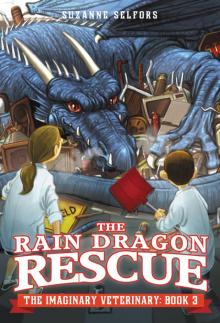 The Rain Dragon Rescue
The Rain Dragon Rescue Ginger Breadhouse and the Candy Fish Wish
Ginger Breadhouse and the Candy Fish Wish Ever After High: Lizzie Hearts and the Hedgehog’s Hexcellent Adventure: A Little Shuffle Story
Ever After High: Lizzie Hearts and the Hedgehog’s Hexcellent Adventure: A Little Shuffle Story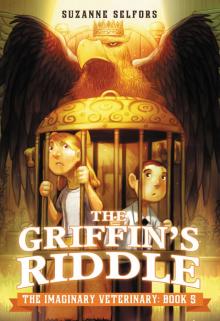 The Griffin's Riddle
The Griffin's Riddle Smells Like Pirates
Smells Like Pirates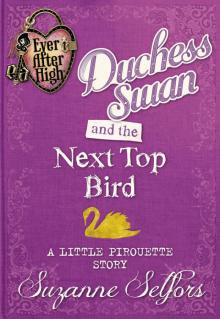 Duchess Swan and the Next Top Bird
Duchess Swan and the Next Top Bird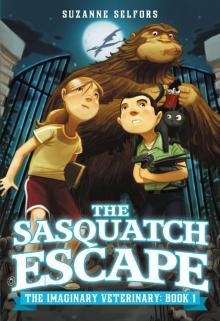 The Sasquatch Escape
The Sasquatch Escape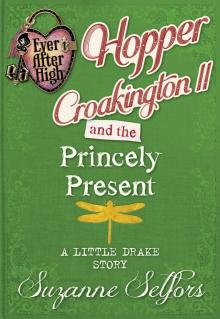 Hopper Croakington II and the Princely Present
Hopper Croakington II and the Princely Present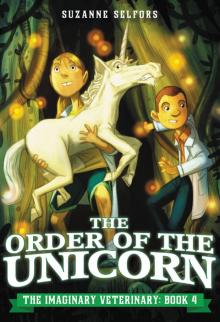 The Order of the Unicorn
The Order of the Unicorn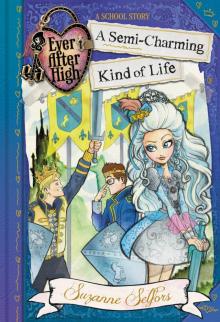 A Semi-Charming Kind of Life
A Semi-Charming Kind of Life Braver
Braver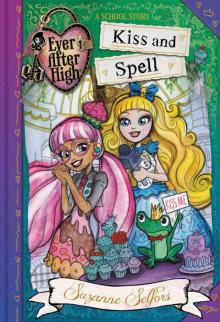 Kiss and Spell
Kiss and Spell Wedgie & Gizmo
Wedgie & Gizmo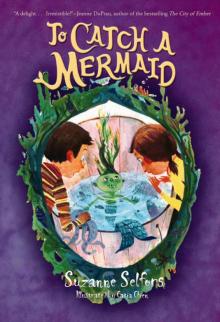 To Catch a Mermaid
To Catch a Mermaid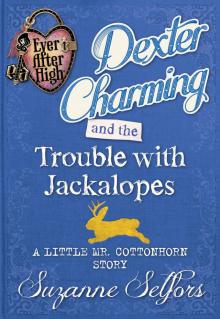 Dexter Charming and the Trouble with Jackalopes
Dexter Charming and the Trouble with Jackalopes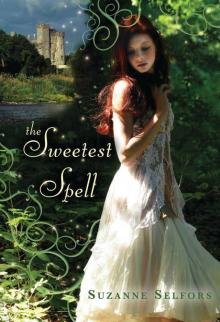 The Sweetest Spell
The Sweetest Spell CoffeeHouse Angel
CoffeeHouse Angel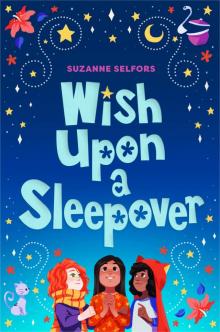 Wish Upon a Sleepover
Wish Upon a Sleepover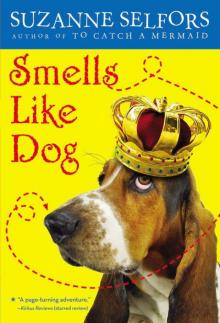 Smells Like Dog
Smells Like Dog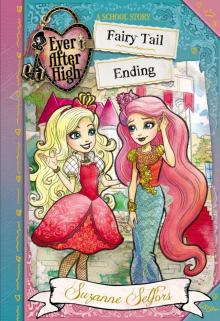 Ever After High
Ever After High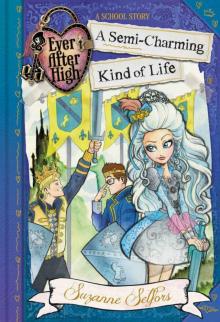 Ever After High: A Semi-Charming Kind of Life
Ever After High: A Semi-Charming Kind of Life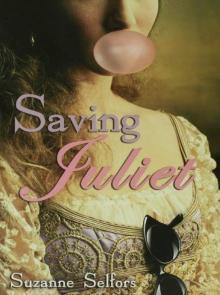 Saving Juliet
Saving Juliet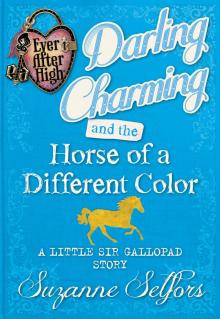 Darling Charming and the Horse of a Different Color
Darling Charming and the Horse of a Different Color Wedgie & Gizmo vs. the Toof
Wedgie & Gizmo vs. the Toof Spirit Riding Free--The Adventure Begins
Spirit Riding Free--The Adventure Begins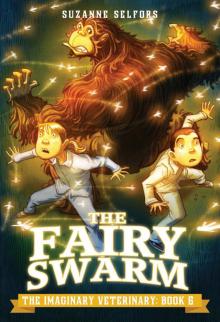 The Fairy Swarm
The Fairy Swarm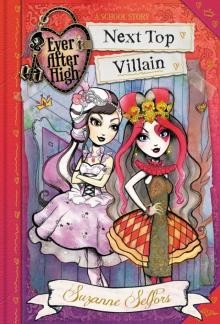 Ever After High: Next Top Villain: A School Story
Ever After High: Next Top Villain: A School Story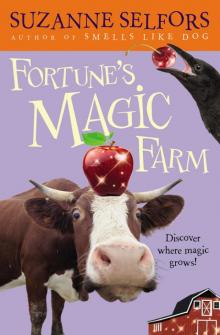 Fortune's Magic Farm
Fortune's Magic Farm The Lonely Lake Monster
The Lonely Lake Monster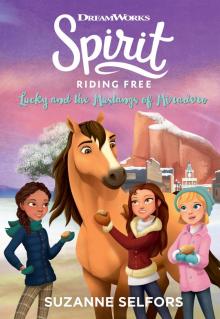 Spirit Riding Free--Lucky and the Mustangs of Miradero
Spirit Riding Free--Lucky and the Mustangs of Miradero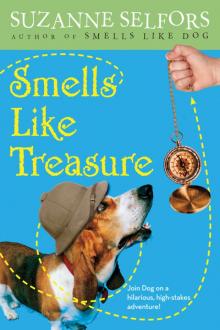 Smells Like Treasure
Smells Like Treasure Mad Love
Mad Love